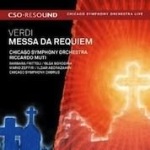Ravishing orchestral playing and choral work combined with an unmatchable understanding of Verdi makes this, despite some issues with regard to the soloists, a very important addition to the Verdi Requiem catalog.
This is Riccardo Muti’s third recording of the work. Listeners familiar with his others (one from 1979; the other from 1987) will recognize a certain “driven” quality to the wilder moments–the Dies Irae, the Sanctus–but elsewhere there is a tenderness that defines the word “cantabile”. And the contrasts are marvelous: the very quiet (but still audible) beginning sets the mystical tone, but the word “Kyrie” opens into more passionate prayer, as it should. The strings are ravishing throughout, keeping the singing line pure, and the brass–both distant and from the pit (this was recorded live, and the ambience is stunning)–intones doom and power. You don’t often hear brass play with true expression, but they do here.
Muti still brings Toscanini to mind more than any other conductor, but he is more pliable in this performance than that other great Italian Maestro or his earlier self. The chorus, like the orchestra, moves from fortissimo to pianissimo on a dime; their singing is effortless, precise, and filled with attention to the text. The quieter, spiritual sections are remarkable for their aura of stillness and meditation and their outbursts thrill and terrify. It’s breathtaking.
The soloists are not quite on that level. Best is bass Ildar Abdrazakov, singing without forcing, allowing his voice to roll forth, and offering an awe-inspiring “Mors stupebit”. He lacks the huge sound of Pinza, Christoff, or Ramey, but that’s beside the point. Mezzo Olga Borodina is at her most expressive, her voice meshes well with Barbara Frittoli’s in the “Recordare”, and she is always audible in ensembles. Frittoli’s voice has taken on a beat at every volume level: Her soft entrance on E in the “Offertorium” wavers in pitch (one recalls Caballé in the part with astonishment), and while her reading of the “Libera me” is dramatic and involved, that beat invariably intrudes and does some damage. Mario Zeffiri, a tenor new to me, has a fine lyric voice and he uses its lightness to his favor, imbuing the “Ingemisco” with gentle pleading. But I prefer a voice with a bit more breadth: Pavarotti (Muti, 1987) and Björling (Reiner, RCA) strike me as ideal, and they are hardly bullies.
There are more than 80 different recordings of this work available and it is impossible to choose just one or two as ideals. The 1967 Solti is manic, fabulous-sounding, and has soloists to die for (Sutherland, Horne, Pavarotti, Talvela); Toscanini (1940) has to be heard (but beware of the sonics); a dark-horse performance led by Robert Shaw (Telarc) is surprisingly chilling and features the lamented, superb Susan Dunn as soprano. Muti (1987) is pretty hot too (and takes exactly the same amount of time as this new performance–89 minutes). The recent Pappano on EMI also is highly recommended. But this new Muti is glorious despite a solo soprano problem; it has just about everything else. [10/4/2010]
































